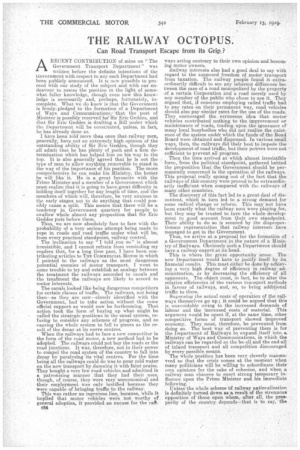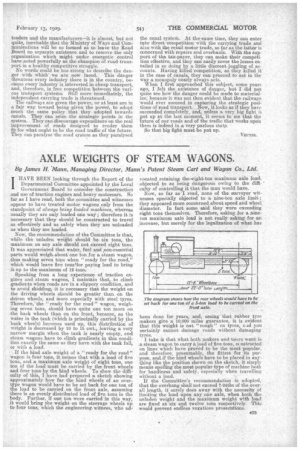THE RAILWAY OCTOPUS.
Page 14

Page 15

If you've noticed an error in this article please click here to report it so we can fix it.
Can Road Transport Escape from its Grip ?
ARECENT CONTRIBUTION of mine on "The Government Transport Department" was Written before the definite intentions of the Government with respect to any such Department had been publicly announced. It is now possible to pro
ceed with our study of the subject and with our en
deavour to assess the position in the light of somewhat fuller knowledge, though even now this know
ledge is necessarily and, perhaps, fortunately, in complete. What. we do know is that the GO ernment is firmly. pledged to the formation of a Department of Ways and Communications,'that the post of Minister is possibly reserved fof Sir Eric Geddes, and that Sir Eric Geddes is drafting a Bill: under which the Department will be -constituted, witless, in fact, he has already done so.
I have been told morethan once that.railway men, generally,have not an extremely high opinion of the
outstanding ability of Sir Eric Geddes, though they
all admit that he has plenty of push. and a firm determination which has helped him on his way to the
top. it is also generally agreed that he is not the
type of man to allow anyt\hing removable to stand in the way of the importance of his Position. The more
comprehensive he can make his Ministry, the better he will like' it. Ile is a great favourite with the Prime Minister and a member of a Governinent which must realize that it is going to have great difficulty in holding itself together for any length of time, and the members of which will, therefore, be very anxious in
the early stages not to do anything that could possibly cause a split. This means that there will be a tendency in Government quarters for people to swallow whole almost any-proposition that Sir Erie Geddes puts before them.
Thus, we are now absolutely face to face with the probability of a very serious attempt being made to rope in roads and road traffic under what. will be, from every practical standpoint, railway control. The inclination to say I told you so" is almost -irresistible and I cannot refrain, from reminding my readers that, for a long time past, I have been con
tributing articles to THE COMMERCIAL Moron in which I pointed to the railways as the most dangerous
potential enemies of motor transport. I went to some trouble to try and establish an analogy between the treatment the railways accorded to canals and the treatment the railways are likely to accord to motor interests.
The canal-s looked like being dangerous comPetitors for -certain classes of traffic. The railways, not being then—as they are now—closely identified with the Government, had to take action without the same official support as would now be forthcoming. That action took the form of buying up what might be called the strategic positions in the canal system, refusing to consider any schemes of progress, and so causing the whole system to fall to pieces as the result of the decay at its nerve centres. When the railways had to-face a new competitor in the farm of the road motor, a new method had to be adopted. The railways could not buy the roads or the road junctions. It was, therefore, not in their power to compel the road system of the country to fall into decay by paralysing its vital centres, For the time being all the railways could do was to pour cold water on the new transport by clamnitie it with faint praise. They bought a very few road vehicles and admitted in a patronizing manner that they had their uses. though, of Course, they were very uneconomical and their employment was only iustified because they were capable of bringing traffic to the railway. This was rather an ingenious line, because, while it implied that motor vehicles were not worthy of general adoption, it provided an excuse for the raft 034 ways acting contrary to their own opinion and becoming motor owners.
Railway interests also had a good deal to say with regard to the supposed freedom of motor -transport from taxation. The railway people found it extraordinarily difficult to see. any inherent difference between the case of a road Monopolized by the property of a certain Corporation and a. road merely used by any member of the public who chose to use it. They argued that, if concerns employing railed traffic had to pay rates on their permanent way, road vehicles should also pay similar rates for the use of the roads. They encouraged the erroneous idea that motor vehicles contributed nothing to the improvement or maintenance of roads, trading upon the ignorance of many local busybodies, who did not realize the existence of the system under which the funds of the Road Board were obtained and dispensed. In various small ways, then, the railways did their best to impede the development of road traffic, but their powers were not sufficient to prevent all progress.
Then the time arrived at which almost irresistible force, from the political standpoint, gathered behind the proposition that the Government should be permanently concerned in the operation of the railways. This proposal really sprang -out of the fact that the railways of this-country were proved to be extraordinarily inefficient when compared with the railways -of many other countries. The discovery of this fact led to a great deal of discontent, which in turn led to a strong demand for some radical change or reform. This may not have been exactly what the railway men were playing for, but they may be trusted to turn the whole development to good account from their own standpoint. Their ability to do so is secured by the disproportionate representation that railway interests have managed to get in the Government. Thus, we arrive at a proposal for the formation of • A Government Department in the nature of a Ministry of Railways. Obviously such a Department should have a railway expert at its head.
This is where the great opportunity arose. The new. Department would have to justify itself by its financial results. This must either be done by achieving a very high degree of efficiency in railway , administration, or by decreasing the efficiency of all opponents. The object must, in fact; be to alter the relative efficiencies of the various transport methods in favour of railways, and, so, to bring additional traffic to them.
Supoosing the actual costs of operation of the railways themselves go up ; it could be argued that this is unavoidable owing to the increased demands of labour and the increased costs of material. 'This argument would be upset if, at the same time, other competitive forms of transport showed -improved economy. They must, therefore, be prevented from doing so. The best way of preventing them is for the Department of Railways to expand itself into. a Ministry of Ways and Communications, in which the railways can be regarded as the be-all and the end-all -of inland transport and all competition discourag.ed by every possible means. The svli-ole position has been very cleverly manceuvred. so that the crisis comes at the moment' when many politicians will be willing to subordinate their own -opinions for the sake of cohesion, and when a railway man chances to exert strong teniporary influeuce upon the Prime Minister and his immediate following. Unless the whole scheme 'of railway natioralization is definitely turned down as a result of the strenuous opposition of those upon whom,after all, the prosperity of the -country depends—that is to Say, the traders and the manufacturers—it is almost, but not quite, inevitable that the Ministry of Ways and Communications will be so formed as to leave the Road Board no separate existence and to remove the only organisation which might under energetic control have acted powerfully as the champion of road transport in a healthy competitive struggle. No words could be too strong to describe the danger with which we are now faced. This danger • threatens every industry there is in the country, beCause every industry is interested in cheap transport, and, therefore, in free competition between the various transport systems. Still more immediately, the independent carrying trade is threatened. The railways are given the power, or at least are in a fair way toward being given the power, to adopt much the same policy that they adopted towards canals. They can seize the strategic points in the systeiu. They can discourage expenditure on the real improvement of roads designed to render them fit for what ought to be the road traffic ef the future. They can paralysothe road system as they paralysed the canal systerh. At the lame time, they can enter iatodirect competition with the carrying trade and also with the retail motor trade so far as the latter is concerned with repairs and oveLauls. With the support of the tax-payer, they can make their competition effective, and they can easily cover the losses entailed in so doing by a little discreet juggling of accounts. Having killed competition, as they killed it in the case of canals„ they can proceed to act in the way a monopoly nearly always acts. When I first approached this subject, some years ago, I felt the existence of danger, but I did not quite see how the danger could be made to materialize, because it was not then evident that the railways would ever succeed in capturing the strategic positions of road transport. Now, it looks as if they have succeeded completely, and, unless a very big fight is put up at the last moment, it seems, to me that the future of our roads and of the traffic that works upon them is indeed in a very parlous state. So that big fight must be put up.






















